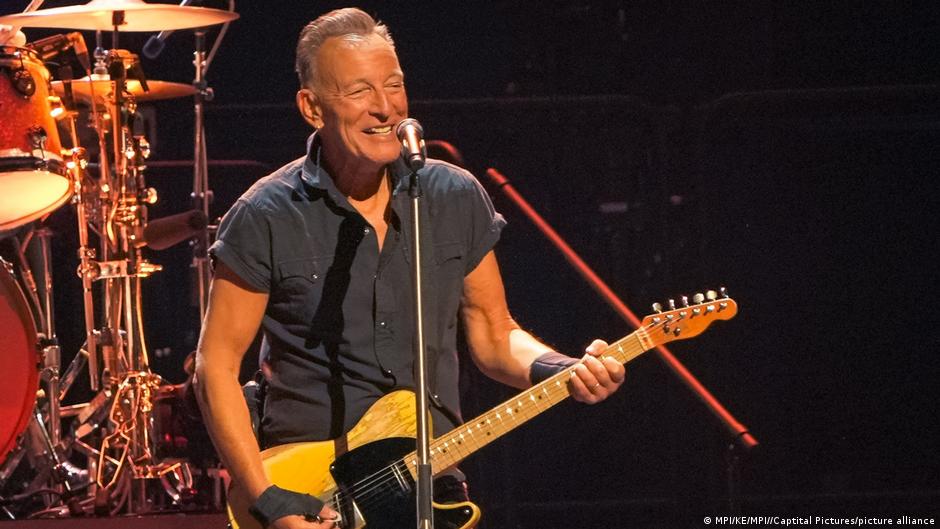
BRUCE SPRINGSTEEN'S 'BORN IN THE U.S.A.': A MISUNDERSTOOD ANTHEM
Chances are, anyone with a musical bone in their body would start bopping their heads when they hear the thumping intro of Bruce Springsteen's 1984 hit, "Born in the U.S.A."
And probably sing along with gusto to its rousing chorus — even if they were not born in the USA.
It is no wonder then that even American politicians — some opposite of Springsteen's political leanings — have tried to capitalize on its galvanizing appeal at election rallies. But more on that later.
On the music map
Released on June 4, 1984, Bruce Springsteen's seventh album, "Born in the U.S.A." matched the record set by Michael Jackson's "Thriller," with seven consecutive US Top 10 hits, catapulting him from beloved stateside rock singer to global megastar.
Besides the eponymous title track, the album's other hits included "No Surrender," "Glory Days" and the Grammy-winning "Dancing in the Dark" — which famously featured a then-unknown Courteney Cox of "Friends" fame in the music video.
The album's themes of working-class life in the Ronald Reagan era particularly struck a chord with Springsteen's American fans, picking up a Grammy for Album of the Year in 1985.
Sony Music is commemorating the album's 40th anniversary with a special-edition release on June 14 featuring new colored vinyl and expanded packaging.
Fitting political tropes?
On the face it, the album projects "Americana."
Its iconic front cover, shot by celebrated American portrait photographer Annie Leibovitz features Bruce Springsteen's jeans-clad posterior, facing the Stars and Stripes. Explaining this creative decision to Rolling Stone in 1984 he said, "The picture of my ass looked better than the picture of my face."
Then there's the title track with its anthemic chorus. The New Jersey-born Springsteen, who has working-class roots himself, would later admit that "Born in the U.S.A." would turn out to be "one of my greatest and most misunderstood pieces of music."
Celebrating or activating America?
Essentially a protest song, it addresses the economic hardships faced by Vietnam war veterans despite (ironically) being glorified for their services to the nation.
It was partially inspired by Ron Kovic's 1976 autobiography "Born on the Fourth of July," about a young man who volunteers for the Vietnam War in the late 60s but returns paralyzed and eventually turns anti-war activist.
The film version, directed by Oliver Stone and starring Tom Cruise, was released in 1989.
"The song is about a disaffected Vietnam veteran who's been chewed up and spat out by his country, but the guy in that song is also claiming his citizenship of America," Steven Hyden, author of "There Was Nothing You Could Do: Bruce Springsteen's 'Born in the U.S.A.' and the End of the Heartland," explained in an interview with pop culture website The Ringer.
"He's not disavowing America. He's not saying, 'I'm leaving the USA.' He's saying, 'I was born in the USA,'" Hyden added.
'My music has been a football'
Despite Springsteen's incisive lyrics that questioned the "American Dream," some — including conservative politicians — viewed the chorus through a narrow, nationalistic lens. Ronald Reagan used it during his 1984 re-election campaign. Donald Trump's supporters played it outside the hospital where he was being treated for COVID in 2020.
Springsteen has over the years spoken against the unauthorized co-opting of this song by politicians — both Republicans and Democrats. He told NPR in 2005, "My music has been a football where I had people from the far-left to the far-right who misrepresent us. It's something I live with and I always have the opportunity to go on stage and say my piece about it."
Springsteen voiced his strong opinion about Trump during his presidency: "Unfortunately, we have somebody who I feel doesn't have a grasp of the deep meaning of what it means to be an American," he said in a 2019 interview with Gayle King for "CBS This Morning."
At a rally in May this year, Trump referred to the musician as a "wacko" liberal and added for good measure, "We have a much bigger crowd than Bruce Springsteen."
Tweaking his (in)famous tune
"Springsteen has made his American dream the subject of his music: a nation that welcomes immigrants, condemns racism and opposes economic inequality. Its people stand together even — especially — amid tragedy," Diane Winston, professor of journalism and communication at USC Annenberg, wrote in the Rhode Island Current.
She added that before Reagan cited him as a Republican muse, Springsteen was content to let his music convey his politics, but turned more candid later.
This has also seen him backing Democrats John Kerry (2004), Barack Obama (2008 and 2012), Hillary Clinton (2016) and the Biden campaign in 2020, for whom he restyled the song "My Hometown."
Meanwhile, "Born in the U.S.A" has evolved over the years with Springsteen performing more low-key versions of it with only an acoustic guitar. Sometimes minus the upbeat chorus — singing only the verses so his audience can better grasp his social commentary on the plight of veterans. NPR reported in 2019 that when the US invasion of Iraq loomed in 2003, Springsteen told his audience the song was a prayer for peace.
During his "Springsteen on Broadway" residency in New York City between 2017 and 2018, it featured a more bluesy intro, after which, unaccompanied, his distinctive gravelly voice almost narrates the verses and famous chorus.
The indefatigable 74-year-old is currently touring with The E Street Band for the European leg of their world tour. According to Spotify, his enduring 1984 hit is part of the setlist.
Edited by: Elizabeth Grenier
Author: Brenda Haas
2024-06-14T11:47:07Z dg43tfdfdgfd